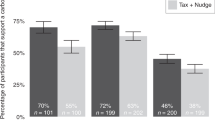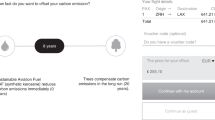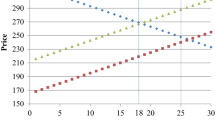Abstract
Are prices or quantities the best regulatory instrument to align private actions with public interests in the presence of externalities? We add another dimension to this ongoing debate by experimentally analyzing the interaction between instrument choice and intrinsic motivation of regulated agents. The response of subjects facing a trade-off between real CO2 emissions and private monetary payoffs to both a price and a quantity instrument are tested. We find evidence that taxes crowd out intrinsic motivation while emission standards are neutral. Crowding is short term persistent and not well explained by established cognitive theories of motivational crowding.
Similar content being viewed by others
References
Bénabou R, Tirole J (2003) Intrinsic and extrinsic motivation. Rev Econ Stud 70: 489–520
Bénabou R, Tirole J (2006) Incentives and prosocial behavior. Am Econ Rev 96(5): 1652–1678
Brekke KA, Nyborg K (2008) Attracting responsible employees: green production as labor market screening. Resour Energy Econ 30: 509–526
CCC (2008) Building a low-carbon economy—the UK’s contribution to tackling climate change, report. Committee on Climate Change, London
Charness G, Gneezy U (2009) Incentives to exercise. Econometrica 77(3): 909–931
De Dreu C, Steinel W (2006) Social decision making in fuzzy situations: motivated decision making and strategic choice. In: De Cremer D, Zeelenberg M, Murnighan JK (eds) Social psychology and economics. Routledge, London, pp 55–78
Ellingsen T, Johannesson M (2008) Pride and prejudice: the human side of incentive theory. Am Econ Rev 98(3): 990–1008
EU (2008) On the effort of member states to reduce their greenhouse gas emissions to meet the community’s greenhouse gas emission reduction commitments up to 2020. COM(2008) 17 final, technical report. Commission of the European Communities
Falk A, Kosfeld M (2006) The hidden costs of control. Am Econ Rev 96(5): 1611–1630
Fehr E, Klein A, Schmidt KM (2007) Fairness and contract design. Econometrica 75(1): 121–154
Fischer P, Huddart S (2008) Optimal contracting with endogenous social norms. Am Econ Rev 98(4): 1459–1475
Forgas JP, Laham SM (2005) The interaction between affect and motivation in social judgments and behavior. In: Forgas JP, Williams KD, Laham SM (eds) Social motivations. Conscious and unconscious processes. Cambridge University Press, Cambridge, pp 168–193
Frey BS (1992) Pricing and regulating affect environmental ethics. Environ Resour Econ 2: 399–414
Frey BS (1997) Not just for the money: an economic theory of personal motivation. Edward Elgar Publishing, Cheltenham, UK
Frey BS, Jegen R (2001) Motivation crowding theory. J Econ Surv 15(5): 589–611
Frey BS, Oberholzer-Gee F (1997) The cost of price incentives: an empirical analysis of motivational crowding-out. Am Econ Rev 87(4): 746–755
Gneezy U, Rustichini A (2000) A fine is a price. J Legal Stud 29(1): 1–17
Heyes A, Kapur S (2011) Regulating altruistic agents. Can J Econ 44(1): 227–246
Kahneman D (2003) Maps of bounded rationality: pschology for behavioral economics. Am Econ Rev 93(5): 1449–1475
Kandel E, Lazear EP (1992) Peer pressure and partnership. J Polit Econ 100(4): 801–817
Kotchen MJ (2009) Voluntary provision of public goods for bads: a theory of environmental offsets. Econ J 119: 883–899
Loewenstein G, O’Donoghue T (2007) The heat of the moment: modeling interactions between affect and deliberation, working paper. Cornell University, Ithaca, NY
Meier S (2007) Do subsidies increase charitable giving in the long run? Matching donations in a field experiment. J Eur Econ Assoc 5(6): 1203–1222
NCF (2006) Phase I EU ETS trading decisions. Report, New Carbon Finance, London
Pillutla MM, Murnighan JK (1996) Unfairness, anger, and spite: emotional rejections of ultimatum offers. Organ Behav Human Decis Proces 68(3): 208–224
Reeson AF, Tisdell JG (2010) The market instinct: the demise of social preferences for self-interest. Environ Resour Econ 47(3): 439–453
Sliwka D (2007) Trust as a signal of a social norm and the hidden costs of incentive schemes. Am Econ Rev 97(3): 999–1012
Tversky A, Kahneman D (1981) The framing of decisions and the psychology of choice. Science 185(4157): 1124–1131
Author information
Authors and Affiliations
Corresponding author
Electronic Supplementary Material
The Below is the Electronic Supplementary Material.
Rights and permissions
About this article
Cite this article
Goeschl, T., Perino, G. Instrument Choice and Motivation: Evidence from a Climate Change Experiment. Environ Resource Econ 52, 195–212 (2012). https://doi.org/10.1007/s10640-011-9524-4
Accepted:
Published:
Issue Date:
DOI: https://doi.org/10.1007/s10640-011-9524-4




